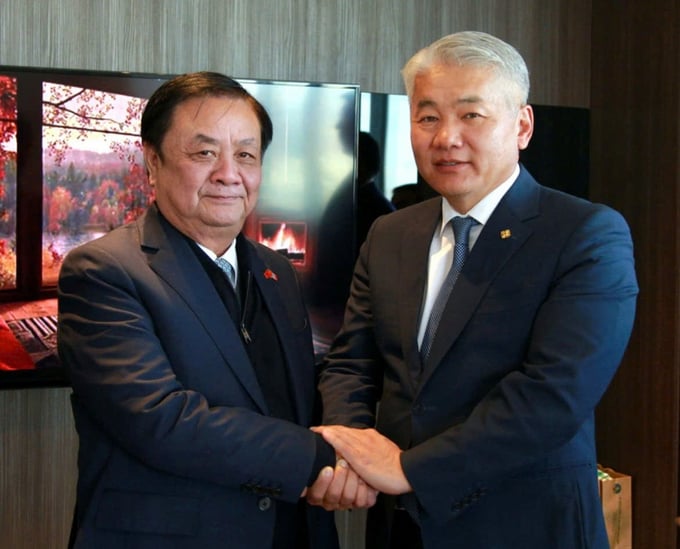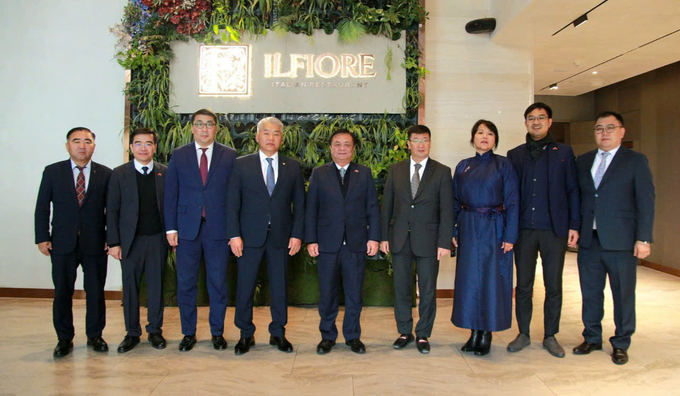November 25, 2025 | 16:46 GMT +7
November 25, 2025 | 16:46 GMT +7
Hotline: 0913.378.918
November 25, 2025 | 16:46 GMT +7
Hotline: 0913.378.918

The elevation of Vietnam-Mongolia relations to a Comprehensive Partnership opens new doors for agricultural cooperation between the two countries. Photo: ICD.
On October 1, in Ulaanbaatar, Minister Le Minh Hoan met with Minister Enkhbayar Jadamba as part of the General Secretary and President Tô Lâm’s state visit to Mongolia. This visit also marked the 70th anniversary of diplomatic relations and the enhancement of the Vietnam - Mongolia relationship to a Comprehensive Partnership.
Bilateral trade between the two countries has grown rapidly in recent years, reaching USD 85 million in 2022, USD 132 million in 2023, and USD 65.5 million in the first seven months of 2024. With this positive momentum, both sides are aiming to increase trade to USD 200 million in the near future.
Minister Jadamba highlighted agriculture as a promising area for cooperation, noting Mongolia’s strengths in livestock breeding and Vietnam’s expertise in crop cultivation and food production.
However, for various reasons, particularly geographic distance and transportation challenges, bringing Mongolian livestock products to Vietnam remains difficult. These challenges have limited economic and trade cooperation between the two countries, leaving it underdeveloped and below its full potential.
The Mongolian minister explained that one of the primary challenges in trade is the high cost and extended time required for international transportation. Mongolia’s location, deep within the mainland, necessitates multimodal and transit-based transportation, making logistics particularly complex. Additionally, Vietnamese goods face stiff competition from Chinese products, putting them at a disadvantage in terms of cost and delivery time.
Minister Jadamba emphasized the importance of finding creative and flexible solutions to overcome these trade barriers, especially those related to transportation. One of the initiatives he proposed is establishing a closer cooperative mechanism with China to address logistical issues.
Under this initiative, Mongolia will supply livestock meat products—one of the country's key exports. In return, Mongolia aims to import rice from Vietnam. Minister Jadamba expressed hope that the two nations could establish an efficient supply chain, where Vietnamese rice is transported via multimodal routes, with China serving as a crucial logistical bridge.
During discussions with Mongolian leaders, Minister Le Minh Hoan agreed on the need to address these logistical bottlenecks to enhance agricultural cooperation. He emphasized that China’s role as a transit country is vital for facilitating the transportation of goods between Vietnam and Mongolia. Effective coordination with China would help reduce transportation costs and shorten delivery times, thus improving the competitiveness of both countries' products in global markets.

The delegation from the Ministry of Agriculture and Rural Development posed for a commemorative photo with representatives from Mongolia’s Ministry of Food, Agriculture, and Light Industry. Photo: ICD.
In addition, Minister Le Minh Hoan extended an invitation to the Mongolian leadership to visit Vietnam and co-chair the upcoming Intergovernmental Committee Meeting, scheduled for late November 2024. He stressed: "This is a pivotal event to advance multifaceted cooperation between our two nations, deserving attention that aligns with the newly upgraded level of our relations."
The two ministers also discussed plans to co-organize the Vietnam-Mongolia Business Connection Forum and promote Mongolian agricultural products in Vietnam. This initiative will be aligned with the 24th International Agricultural Exhibition (AgroViet 24).
“We are preparing a special section for Mongolian enterprises,” Minister Le Minh Hoan explained. “This will allow you to display and promote your products, while also engaging with Vietnamese and international businesses.”
Minister Le Minh Hoan affirmed that boosting agricultural trade between Vietnam and Mongolia would not only help Mongolia strengthen its food security but also offer Vietnam the opportunity to expand its rice export market. Close coordination with China in transportation logistics, he noted, would be a crucial factor in expediting the flow of goods and resolving long-standing trade barriers.
The state visit of General Secretary and President To Lam to Mongolia, from September 30 to October 1, marks the beginning of a new chapter in bilateral relations, as the two countries officially upgraded their partnership to a Comprehensive Partnership. This strategic shift paves the way for breakthrough developments in various sectors, including agriculture.
Translated by Quynh Chi

(VAN) Deputy Minister Nguyen Quoc Tri emphasized the determination to prevent violations at CoP20, sharing enforcement results and commitments to strengthen cooperation with the international community in the coming period.

(VAN) In addition to strengthening the relationship between schools and enterprises, the Aus4Skills project expands opportunities for female students and people with disabilities to work in the transport and logistics sector.

(VAN) Nghe An is preparing policy, technical, and resource steps to participate in the forest carbon credit market.
/2025/11/25/1648-2-110733_532.jpg)
(VAN) From 2011 to 2023, Ca Mau province lost approximately 6,200 ha of coastal land and protection forests due to erosion, threatening many residential areas, infrastructure facilities, and production zones.

(VAN) Quang Ngai holds strong potential for carbon credits but needs a clear legal and policy framework to secure sustainable revenue from this resource.

(VAN) With its diverse ecosystem, Phu Quoc National Park plays a vital role in environmental protection and biodiversity conservation and serves as the core zone of the Kien Giang World Biosphere Reserve.

(VAN) Cooperation activities under the Aus4Skills program focus on: logistics professional development, competency-based training and assessment (CBTA), leadership innovation, and digitalization.